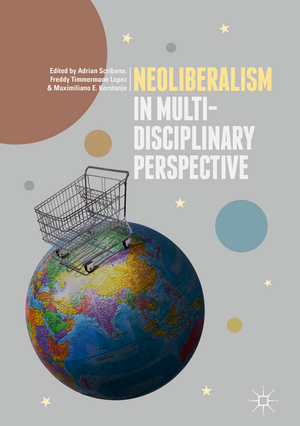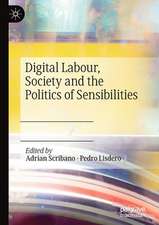Neoliberalism in Multi-Disciplinary Perspective
Editat de Adrian Scribano, Freddy Timmermann Lopez, Maximiliano E. Korstanjeen Limba Engleză Hardback – 20 aug 2018
| Toate formatele și edițiile | Preț | Express |
|---|---|---|
| Paperback (1) | 579.84 lei 6-8 săpt. | |
| Springer International Publishing – 5 ian 2019 | 579.84 lei 6-8 săpt. | |
| Hardback (1) | 727.97 lei 6-8 săpt. | |
| Springer International Publishing – 20 aug 2018 | 727.97 lei 6-8 săpt. |
Preț: 727.97 lei
Preț vechi: 887.76 lei
-18% Nou
Puncte Express: 1092
Preț estimativ în valută:
139.34€ • 151.41$ • 117.12£
139.34€ • 151.41$ • 117.12£
Carte tipărită la comandă
Livrare economică 21 aprilie-05 mai
Preluare comenzi: 021 569.72.76
Specificații
ISBN-13: 9783319776002
ISBN-10: 3319776002
Pagini: 233
Ilustrații: XVII, 233 p.
Dimensiuni: 148 x 210 mm
Greutate: 0.45 kg
Ediția:1st ed. 2019
Editura: Springer International Publishing
Colecția Palgrave Macmillan
Locul publicării:Cham, Switzerland
ISBN-10: 3319776002
Pagini: 233
Ilustrații: XVII, 233 p.
Dimensiuni: 148 x 210 mm
Greutate: 0.45 kg
Ediția:1st ed. 2019
Editura: Springer International Publishing
Colecția Palgrave Macmillan
Locul publicării:Cham, Switzerland
Cuprins
1. Introduction: The Multiple Janus Faces of Neoliberalism.- 2. Neoliberalism and Crisis of the Republican Pact.- 3. Neoliberalization and New Commodification Frontiers: A Global Critique of Progressive Reason.- 4. Neoliberalism in the Culture of Terror.- 5. The Thousand Faces of Neoliberalism: From Politics to Sensibilities.- 6. Neo-Liberal Effects on Time Perception: When "Time Is Money" Turns Into “Hybrid Time”.- 7. Implosion of Time: Body, Emotions and Terror in the Neoliberal Civilization in Chile.- 8. The Neoliberal Tourism System: Strategies of Production and Distribution of Travel.- 9. Neoliberalism, Outsourcing and Domination.- 10. Facing The Self-Government Test: Italian Youth and the Avatars of Neoliberalism.- 11. Capitalism, Hacking, and Digital Media.
Notă biografică
Adrian Scribano is Director of the Centre for Sociological Research and Studies (CIES) and Principal Researcher at the National Council for Scientific and Technical Research of Argentina.
Freddy Timmermann Lopez is Senior Lecturer at Catholic University Silva Henriquez, Chile.
Maximiliano E. Korstanje is Senior Lecturer in the Economics Department, University of Palermo, Argentina.
Textul de pe ultima copertă
This volume brings together well-versed authors from four continents to critically discuss the roots of neoliberalism and how academics use the word today. Neoliberalism has recently recycled and mutated towards new forms of radicalization where fear plays a leading role legitimating policies, which would otherwise be overtly neglected by citizens. The authors ignite a new discussion within social sciences, combining the advances of sociology, history, anthropology, communication and the theory of mobilities to understand the different faces and guises of neoliberalism.
Adrian Scribano is Director of the Centre for Sociological Research and Studies (CIES) and Principal Researcher at the National Council for Scientific and Technical Research of Argentina.
Freddy Timmermann Lopez is Senior Lecturer at Catholic University Silva Henriquez, Chile.
Maximiliano E. Korstanje is Senior Lecturerin the Economics Department, University of Palermo, Argentina, and Fellow at CERS University of Leeds, UK, and University of Havana, Cuba.
Caracteristici
Aims to answer with a pluralistic approach the question, “What is the meaning of neoliberalism today?” Provides a systematic reflection on what neoliberalism is, and addresses a host of problems, which allows the reader to understand the social practices, narratives, and processes that characterize neoliberalism Contributes notably to the grounds of social sciences, igniting a new discussion, which escapes to the unilateral barriers of ethnocentrism


























